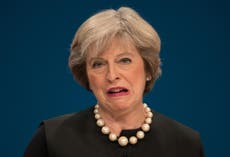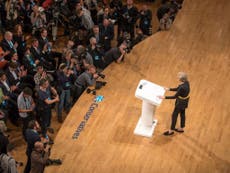Theresa May is about to announce something big for ‘ordinary working-class people’
Theresa May, in her disciplined, defensive media round, let slip one phrase to Nick Robinson on Today this morning: 'We’re going to make a number of changes that are going to help ordinary working-class people.'


So far, it has been a party conference that works for everyone. The Conservatives’ slogan has worked its way into the hive-mind of the journalists and politicians in Birmingham. Theresa May has given the party members what they want, which is to hear a Tory Prime Minister tell them they are leaving the EU. She has given journalists what they want, which is lots of process stories about how it is going to happen: Article 50 and a Great Repeal Bill.
By keeping her two immediate constituencies happy, she has given herself space to reimpose party discipline. Party members, who never had much time for David Cameron, have been cooing about how wonderful she is. “She stops to talk to people,” I’m told. She really is one of them, in a way that makes it abundantly clear that Andrea Leadsom never had a chance in the leadership election.
Journalists, who like nothing better than complaining that political leaders seem to have more important things to do than talking to them, have been treated to a series of interviews with the refreshingly media-sparing Prime Minister. Andrew Marr’s sofa on Sunday, Good Morning Britain this morning and then the Today programme. First-class defensive performances, all of them (“I’m being told by your aides here that you’ve got to go,” said Nick Robinson, cheekily breaking the fourth wall), but they give us more to write about and distract us from being too rude about the conference speeches.
Most of the speeches have been paint-dryingly, grass-growingly, sheep-countingly dull, because May has obviously got the message through to ministers that if they want to get on, they had better mind what they say. Only Boris Johnson on Sunday had the verbal inventiveness to make a speech about nothing very much an entertainment (London as “a great jiving funkapolitan melting-pot” and “I have to tell any lingering gloomadon-poppers…”).
And it is notable that the only ministers allowed to make new announcements were Amber Rudd, in May’s old job as Home Secretary (restoring Labour’s migrant impact fund that was abolished under Cameron), and Michael Fallon, the Defence Secretary, who was allowed to say something about May’s Mastermind specialist subject, the European Convention on Human Rights.
Neither announcement amounted to much – the idea that Britain can opt out of the Convention in combat zones appears to be mistaken – but it kept the conference ticking over in a way that works for everyone.
All it needs now is a good closing speech from the new Prime Minister tomorrow, and she will be well set for the next stage of her honeymoon with the Tory party, the media and the British people to run for the whole duration of the Article 50 period of preparation for D-for-Departure-Day.
Naturally, she won’t want to be seen to be going for the presentational device of having a surprise announcement in her speech tomorrow. So she will just make the surprise announcement and collect the plaudits for “no spin”. All she really has to do to make this a successful conference is to avoid early election fever raging out of control before summoning Laura Kuenssberg to Downing Street to say that the thought had never crossed her mind. So she has already passed that test.
But she did, in her disciplined, defensive media round, let slip one phrase to Nick Robinson on Today this morning: “We’re going to make a number of changes that are going to help ordinary working-class people.”
I suspect there will be a big policy announcement in her speech tomorrow aimed at the the people who are “just managing”, those on “19, 20, 21 thousand pounds a year” to whom she referred in her “meritocracy” speech last month. It’s almost how politics used to be: when you have to listen to the speech for the news, instead of having it briefed to journalists in advance.





Join our commenting forum
Join thought-provoking conversations, follow other Independent readers and see their replies